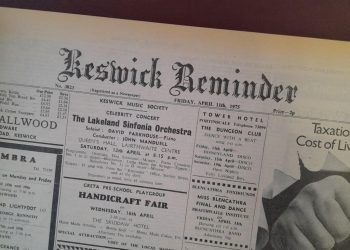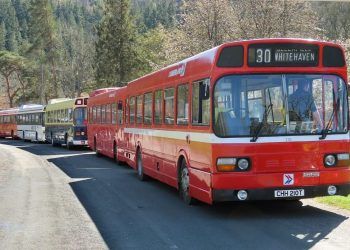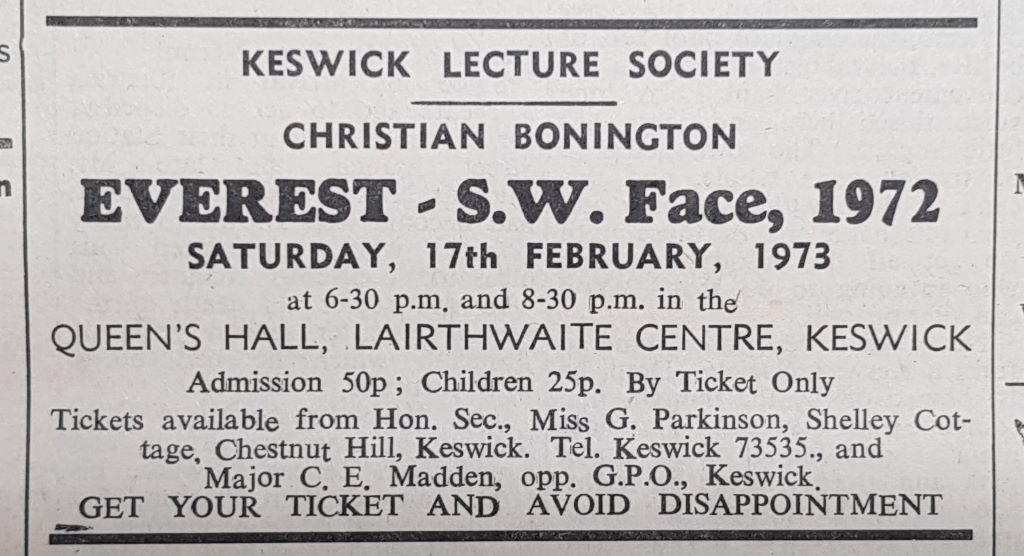
Looking back through The Keswick Reminder’s archives from around this week 20, 30, 40 and 50 years ago.
20 years ago
Development plan drawn up for pencil company site
A multi-million pound scheme to provide a new home for Keswick’s historic pencil making industry and live/work units in the existing factory has been unveiled.
The Cumberland Pencil Company is at present sketching out plans for a new purpose-built 40,000 square feet factory near its current Southey Hill premises, releasing the present three-story mill for redevelopment.
The world-renowned fine art Derwent pencils have been made in Keswick since 1832, and the Pencil Company has recently invested more than £1 million in new equipment, winning a Queen’s Award for Enterprise. Its products are sold in 74 countries across the world with more than half the pencils made in Keswick being sold abroad.
The company is owned by global stationery company Acco Brands, but the general manager, David Sharrock, has explained that its existing manufacturing base, a 1920s mill on a six acre site near the town centre, is no longer suited to 21st century production. The company hopes to move into a specially-commissioned factory on the same site within the next two years.
The pencil industry is Keswick’s largest outside tourism; the Pencil Company currently employs 80 staff and Mr Sharrock says the move will help guarantee the future of the old-established business in the town together with the jobs and it will possibly lead to future expansion.
“We have 80 people making word-beating products here in conditions which are not ideal right now,” says Mr Sharrock. “This scheme will create a much better work environment with space for us to grow.”
The Pencil Company has approached Penrith-based developers Lowther Manelli in partnership with Story Construction of Carlisle to develop plans for the site.
The intention is to convert the present mill into live/work units and create affordable homes for local people on part of the remaining site.
The existing Pencil Museum, which attracts thousands of tourists every year, will be relocated on the ground floor of the mill.
30 years ago
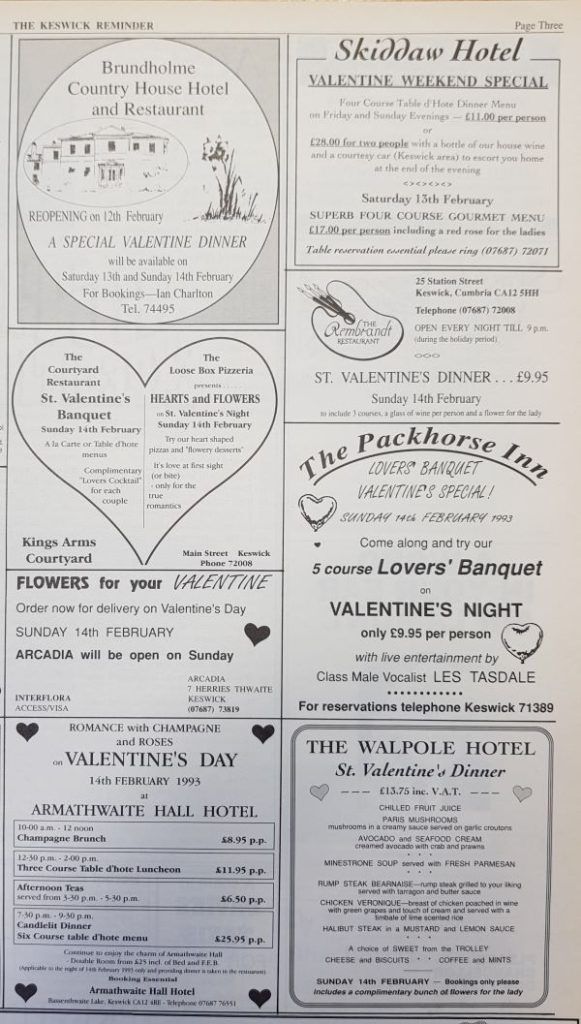
Town councillor’s plea for theatre
Town Councillor Paul Buttle, who is asking his council to pledge £100,000 from the Town Project Fund to a new theatre for Keswick, has prepared a report for his fellow councillors in which he says the theatre “represents the best possible benefit we could ever hope to obtain” from the Fund.
He believes a pledge to a new theatre scheme would mean that the Town Council would have made a major contribution to obtaining for Keswick a £1.2 million investment “that will raise the status of the town and will be of great benefit to all its inhabitants.”
In his report to the council, Mr. Buttle refers to a lack of unanimity about how the money in the Town Project Fund should be allocated.
Indeed, he believes the fund may have grown so big that councillors are frightened to use it, and there appears to him to be “only agreement not to agree on anything.” He warns of the danger of dissipating the money on several projects where the impact will not be significant.
Opening of Trinity School extension
The new extension to Trinity School was officially opened on Wednesday afternoon by Canon Ronald Johns of Carlisle Cathedral. Formerly Vicar of Borrowdale, Canon Johns was a Governor of Trinity School for some years, also vice chairman of the Governors when Canon Richard Watson was chairman.
Canon Johns spoke to the children about the importance of education and told them about the new Education Centre at the Cathedral which tells of its history and of the former Abbey which stood on that site.
He was invited to cut the golden ribbon from the hall, where the children, their teachers, governors and guests were gathered, into the new teaching unit by Headteacher, Mr. A. M. Guy. The Revd. Nigel Holmes, chairman of the Governors, read a prayer of blessing, and everyone joined in a special hymn which was accompanied by Miss Louise Sinton, the teacher in charge of music, and a group of young instrumentalists.
Arctic expedition
A Keswick girl has been selected from more than 300 young people from all over Britain to take part in the British Schools Exploring Society’s expedition to Svalbard, Arctic Norway, as part of the Society’s 1993 Expedition programme to wilderness areas.
Jane Humphreys, a Sixth Form student at Keswick School, has been chosen to represent Keswick and Cumbria on the expedition. She is one of a dozen young explorers who are due to fly out on July 16th – two days before her 18th birthday!
They will spend six weeks on the Svalbard Archipelago, a group of islands lying on the edge of the pack ice in the Arctic Ocean, almost midway between the Arctic Circle and the North Pole.
40 years ago
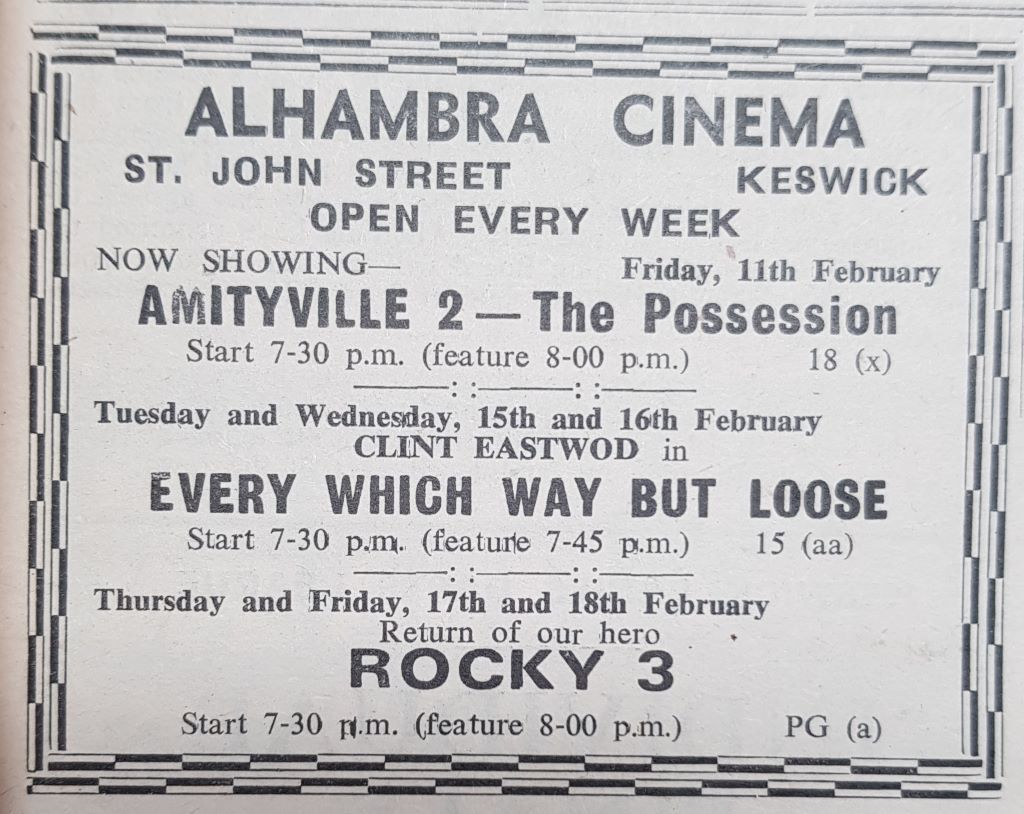
The Church and the Bomb
The talk given at Lairthwaite last Saturday by the Revd. Dr. John Elford, co-author of the report on ‘The Church and the Bomb’ commissioned by the Church of England’s Board for Social Responsibility, began with a brief, though comprehensive outline of the various weaponry now available and their capabilities. Dr. Elford went on to discuss the options open to a nation with an ever-increasing need to halt the arms race.
The report, having weighed up the differing approaches to disarmament, came to the conclusion that the most politically feasible policy was one of ‘unilateral disarmament within a multilateral setting.’ This would mean a gradual downward spiral of nuclear arms undertaken by individual countries within an international stage of deceleration.
One point raised by Dr. Elford in his speech was that a Christian need not necessarily be also a pacifist. He expanded on this point outlining the various types of pacifism which can be adopted and although it was evident he had not convinced some members of his audience on this point, he had brought to attention the very real and immediate need for everyone to become aware and informed on this vital issue.
Mr. Martin Brannan Resigns
Martin Brannan, O.B.E. the longest serving member of the Cumberland and Cumbria County Councils has retired after twenty-two years’ service.
A Londoner by birth, he and his brother Sydney established the Brannan Thermometer Factory at Cleator Moor after the war, bringing a new industry to an area of chronic unemployment. Together with his wife Phyllis, he has been actively engaged for the past thirty-five years in political and public affairs at both local and national level.
During the 1955 and 1959 General Elections, he contested the Workington Parliamentary Division in the Conservative interest against Fred (later Lord) Peart before being elected Cumberland County Councillor for Keswick.
He was chairman of the Cumberland Fire Committee and vice-chairman of the County Finance Committee.
50 years ago
Mr Roger Wakefield
The funeral of Roger Wakefield took place on Monday, February 5th, at St. Paul’s and All Saints’ Church, Whitwell, where he and his wife had become very active participants in church and village life, he having rewired the church organ and been treasurer of the Parochial Church Council for some years. He was the younger son of Mrs. A. W. Wakefield of Applethwaite, Keswick, and the late Dr. A. W. Wakefield, a well-known Everest climber.
Mr. Roger Wakefield kept his love of the hills to the end and whenever he could be spared from his senior engineering job at the BBC was to be seen wandering the hills with his wife and children. He and his wife shared his mother’s love of music and were leading members of the New Philharmonia Choir which sang excerpts from the “Elijah” at his funeral.
Thirlmere
BBC Television’s “The Longest Drink,” shown on Tuesday evening, was a documentary on the problems and difficulties of providing a large city with adequate supplies of water for commercial and domestic use. The city featured in the documentary was Manchester, and the story of supplying this industrial city with water from the Victorians’ floodings of the valleys to the use of modern technology made instructive viewing.
Scenes from the “Coronation Street” area of Salford contrasted sharply with those of Thirlmere, Haweswater, Wythburn Church, foresters at work in the woods, two local shepherds with their sheep on the fells above Thirlmere, and the Water Board staff at their duties.
Interviews with technicians and others were excellent and contributed to the overall story of water from the lake, through the city and to the sea — with one exception. Perhaps, in editing the film, part of the interview with the Estate Manager at Thirlmere was “cut,” thus putting his remarks out of context, but it is sad to think that viewers in other parts of the country were left with such a wrong impression of those who live and work at Thirlmere. And as they were not given an opportunity to correct this impression, the “Reminder” would like to place on record the remarks made yesterday by Mr. Johnston Edwards, M.B.E., Head Forester at Thirlmere for over twenty years.
Mr. Edwards expressed his great admiration for all the workers at Thirlmere, and said he always found them of cheerful and kindly disposition, willing to enter into and help with all aspects of village activities. During the war years over two thousand linear feet of pulp wood and prop wood, in addition to sawn timber, were supplied from Thirlmere. “I am puzzled to know why there should be a run-down of the Forestry activities which are so very important in the conservation of the water, which is the prime purpose of the tree planting at Thirlmere,” said Mr. Edwards.
Death of Mr. Tom Nixon
Since his arrival in Keswick 37 years ago to act as dispenser for Messrs Cowen at their Station Street branch, the late Mr. Thomas Nixon, Blencathra Street, had become well known to many people who appreciated his pleasant, courteous manner and who will regret his death at the age of 59 after several years of ill-health which he had borne with fortitude.
Tom Nixon was born in Preston but he was brought up and educated in Lancaster, where his family moved from Preston, and he developed a keen interest in sport which he retained throughout his life. He was an oarsman and a rugby player in his younger days but he enjoyed many other sports as a spectator. Mr. Nixon was also interested in the affairs of the Keswick Lecture Society to which he gave several years much appreciated service as projectionist.
During the last war he served with the Royal Signals and saw service in North Africa and Italy. He is survived by his wife and son Thomas.




